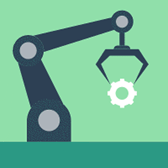 The present era is one of automation. Businesses are going fully automated to produce results more efficiently than was ever possible. It saves time, money, and reduces errors.
The present era is one of automation. Businesses are going fully automated to produce results more efficiently than was ever possible. It saves time, money, and reduces errors.
There is an ongoing debate about what automation will bring to the economy. However, there is no doubt that the future of automation is promising, and it will change the workplace and economy. But can this really be true
According to Max Kolysh, CEO and co-founder of Dover, automation is crucial for businesses to adopt because it is currently taking place. These technologies are currently being used by businesses, so if yours isn’t, you are already behind.
In this blog, I am going to briefly explain automation and how it is changing the world.
What Is Automation?
Automation in workplaces involves the use of systems which assist in performing repetitive or boring tasks without the need for human intervention.
Automation can be in the form of robots or machinery to do physical tasks, or it can be software and algorithms to help with data collection.
The result? It helps by speeding up the process, reducing labor costs and increasing efficiency and productivity.
How Is Automation Changing the Future of Work?
Now let’s take a closer look at why automation is gaining popularity and how it is going to change the future of work.
Simplify Tasks, Save Time, and Money
Automation simplifies a variety of complex tasks, which leads to saving time and money. So, employees enjoy a better experience and customers get better service. Let’s discuss the types of automation that are becoming popular.
Employee Analysis
The company holds employees’ data that is cumbersome. It is not possible to go through all that information and use it because it requires a lot of time and effort.
Automation tools can dig up all the relevant information that is needed or highlight some important insights. Later on, the HR department can use it to boost employee morale.
Recruitment Process
Searching for and hiring the right staff is not an easy process. Businesses often face a lot of issues in this regard. But with automation hiring tools, you can simplify the process. Using the specific keywords can help you narrow down thousands of applicants to the few best ones.
Employee Onboarding
Similar to recruiting, the employee onboarding process is tedious and time-consuming. With automation tools and software, companies can easily set up new accounts where all relevant information, data, documents, and procedures are given.
Customer Support
Customer support’s purpose is to provide round-the-clock assistance. With an automation process set-up, even if the staff is not present, businesses can easily respond to queries and concerns at any time.
Furthermore, for a more personalized touch, several programs also let you plan automated follow-ups by phone or email.
Help Desk
What about employees’ queries and concerns? Well, automated tools can also provide them with the information they need. For example, information regarding holiday allowances, Wi-Fi passwords, solving basic computer issues, and much more.
Marketing
Nowadays, marketing plays a crucial role. When businesses are unable to give proper time to it, they suffer. But with automatic tools, you can keep track of social media updates, send emails, and keep the marketing process moving. The content that will be delivered will be highly relevant, personalized, and appropriate.
The Benefits of Automation in the Workplace
Listed below are the key benefits that automation can offer to workplaces.
Employee Engagement
Automation can perform repetitive tasks while allowing the employees to focus on more important tasks that add value. It could be those tasks that can only be performed by the employees and are interesting to do.
According to the research conducted by Zapier, a software company, 90% of employees agreed that automation has improved workplace employees’ lives. Also, 65% of the tasks performed by automation have reduced their stress levels.
Lower Operating Costs
Automated tools are capable of performing tasks that would require three to five people. Furthermore, automation tools use fewer heating systems, which reduces energy costs in addition to labor costs.
Few Errors
Whether automation is assigned to handle simple tasks like creating new employee emails or complex tasks like financial projects, it reduces the potential for errors to occur. Humans can get distracted easily, which causes errors, which is not the case with automated tools.
Worker Safety
Workers are removed from performing hazardous jobs by automated tools. Workers are now protected from the dangers of working in a factory.
Increase Output of Production
Automation can operate continuously, and without supervision. You can therefore produce more if you choose to. For example, with packaging industry automation, new items can be introduced quickly without interrupting ongoing operations. This allows for a quicker introduction of those products into the production process.
Conclusion
So the bottom line is that automation is crucial if you want to succeed in this competitive industry. It saves time and costs and increases efficiency and productivity. In other words, automation is the future for both small and large businesses.
